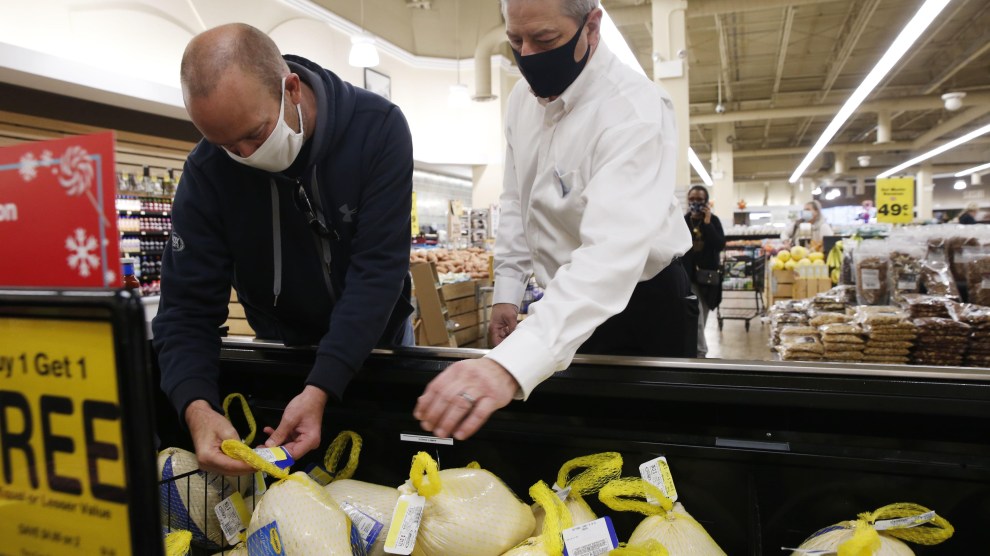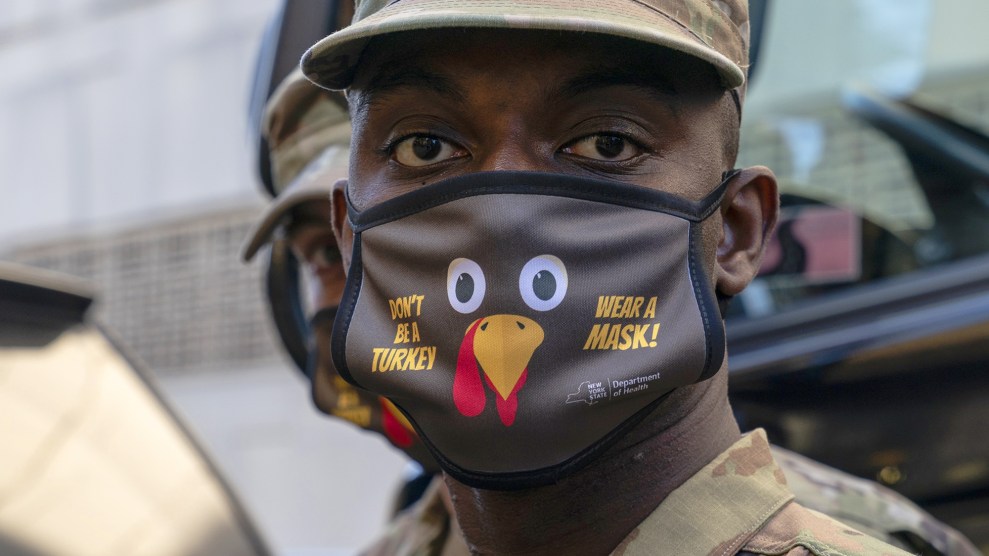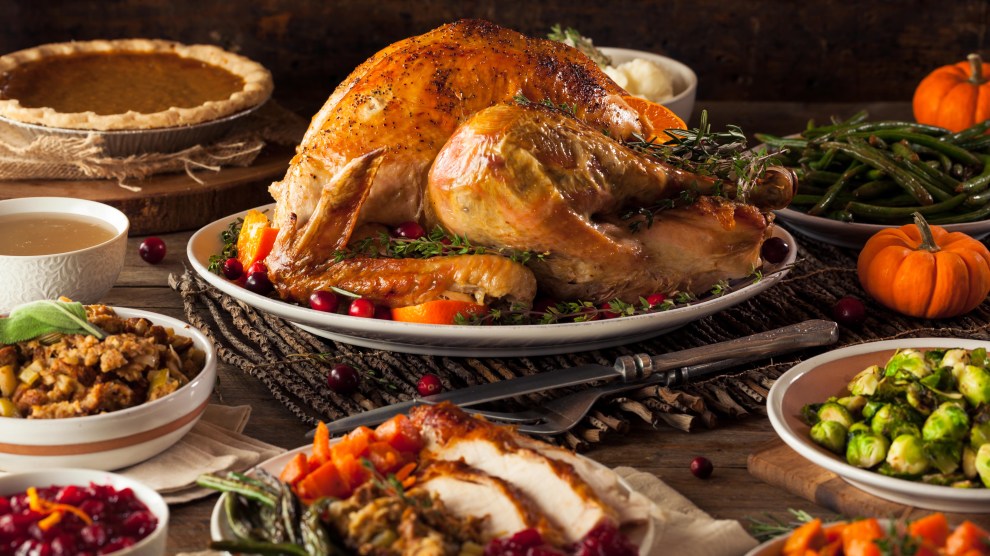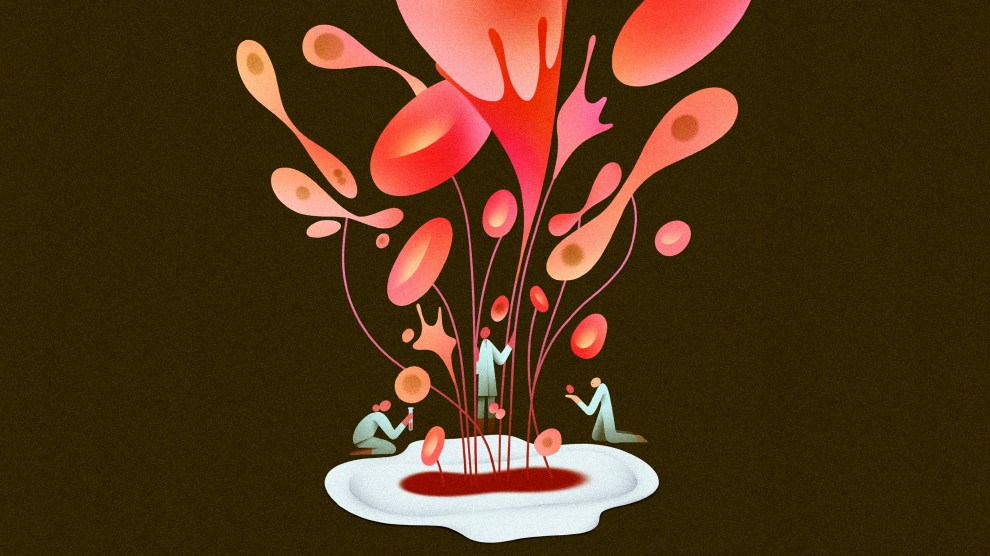
TNS/Zuma
Earlier this week, I asked how you planned to observe this very unusual Thanksgiving. I was overwhelmed with the responses. Some of you are planning very careful, socially distanced gatherings with family. Others are spending the day alone, or using it to honor Native Americans on whose stolen land we normally feast. Below are just a few responses that highlight the variety of ways people think about and practice the holiday.
From Kay and Lewis Olson in Minnesota:
We will forego the usual Thanksgiving gathering. We are over 80 and have underlying health concerns. The gathering posed an unacceptable level of risk. Our daughter-in-law will be delivering meals to us so we won’t miss out on the feast. It’s only one year. We can wait.
From Bill McCabe:
I don’t like to call the day Thanksgiving because it promotes systematic racism and has such a terrible history. I do enjoy the traditional food and since I live on a mountain with only a wonderful black lab for company we will share a meal.
He has ordered turkey (breast only) and gravy with a side of some nice pieces of cheese and a small amount of cherry pie for desert.
I will add a salad and some stuffing on my plate.
After the meal we will either walk in the woods or go for a “barking ride” along the Clinch River.
Peter Kenyon:
We don’t celebrate Thanksgiving in Australia, not now in spring or (more appropriately) in autumn either. That’s a pity. In Thanksgiving I see links to a past when people’s daily survival was less confident, when we had to be much more attuned to a local nature and its ability to sustain and nurture. Settlers couldn’t depend on a global food system to deliver food “from somewhere” and they were appreciative and humbled by getting through another year. It lent, perhaps, a small sense of being dependent on place, a notion that underpins Indigenous thinking all around the world and which settler agriculture and modern transport networks have done away with. The hubris of the modern food system has no need of Thanksgiving or its underpinning philosophy.
I don’t think it’s too far from the truth to suggest that our contemporary “from anywhere” food thinking supports a carelessness and dangerous disregard for our environment that has led to global warming, inhumane farming methods, soil erosion and loss of productive farmland, depletion and pollution of our water systems.
So Thanksgiving for me—a non-practicer—presents a chink of opportunity to note and respond to the carelessness with which we approach food and our connection to place. And an opportunity to more rigorously build into the celebration of Thanksgiving a more thoughtful regard for the small, local things that make life worthwhile and sustainable.
Isabella Lewis:
I am choosing to break tradition and use this opportunity to celebrate our Native American friends and neighbors. We were gifted a venison roast by a Native American friend who went hunting recently. He was lucky and got himself a deer. I have never eaten Bambi before, and I am not sure how much I will eat of this deer; but it is a gift and we feel we must honor the hunter and the prey. So I will pray to the spirit of the deer and give thanks to our hunter friend, thereby acknowledging the generosity they both bestowed upon us.
Looking forward to the return of the light and a brighter America, we will open a good bottle of wine and celebrate life and good health.
Joan Fenton:
After an extremely hot, record-breaking summer that lasted with several 90 degree days into November, we desert dwellers have finally received our reward: temperatures for a few months in the 60s to 80s.
As a result, our family’s Thanksgiving dinner will be held for 14 of us who live in the Valley of the Sun. We will gather outdoors under our trees, with everyone entering through a gate directly into the yard.
All food brought will be in crock pots. Each of our adult children and their families will sit at separated tables, and we will be at our own table. Everyone will use hand sanitizer before serving themselves buffet style. We’ll mask up when not eating.
We know how to be respectful and loving toward one another, especially at this perilous time, because we, their parents, are 77 and 80. We are truly thankful, and not just on November 26.
The painful and untrue Thanksgiving myth is slowly unraveling in many churches, mine included. At meetings for about the past three years, we publicly remember that our activities are being held on the land once inhabited, and usually stolen, from the ancestors of our Indigenous sisters and brothers. We Presbyterians have a long way to go, but we are beginning our journey, asking our Native American friends to guide us.
Mechelle Schneider:
Originally my daughter, a nurse, who lives in Wichita, KS, was planning to test Monday and head to Michigan for Thanksgiving. I haven’t seen her in about 18 months. Then on Thursday she came into contact with someone who was COVID positive. She realized that even if she tested negative on Monday, she could bring COVID with her. My other daughter invited me, but if I went to her home, there would be four households together. So I will roast a chicken, prepare my favorite side dishes and share my meal with my two Siamese cats.
Today I learned that my high school British lit teacher died of COVID. He was 94. The last time I saw him was at a coffee shop. He recited Wordsworth’s “Daffodils” for me. Even though he was 94, his parents were both over 100 when they died. I figure he was cheated of at least six years.
I want to survive this pandemic, and I want to survive the Trump administration. A little isolation will not hurt me. This is not what anyone wants, but I want to see our country, families, and friends come through to the other side.
No matter how you plan to spend the day, I hope you make the best of it. We at Mother Jones will be out Thursday and Friday, so we’ll see you next week. Eat up!
This post was brought to you by the Mother Jones Daily newsletter, which hits inboxes every weekday and is written by Ben Dreyfuss and Abigail Weinberg. It regularly features guest contributions by our much smarter colleagues. Sign up for it here.















